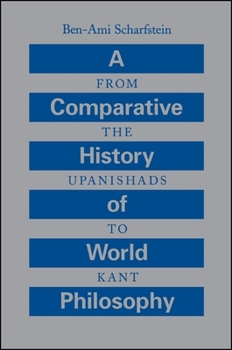A Comparative History of World Philosophy: From the Upanishads to Kant
Select Format
Select Condition 
Book Overview
Ben-Ami Scharfstein is Professor Emeritus of Philosophy at Tel-Aviv University. He is the author of eleven books, including Amoral Politics: The Persistent Truth of Machiavellism and Ineffability: The Failure of Words in Philosophy and Religion, both published by SUNY Press.
Format:Paperback
Language:English
ISBN:0791436845
ISBN13:9780791436844
Release Date:February 1998
Publisher:State University of New York Press
Length:704 Pages
Weight:2.05 lbs.
Dimensions:1.3" x 5.9" x 9.0"
Customer Reviews
2 ratings
Book covers full range of world philosophy
Published by Thriftbooks.com User , 24 years ago
This is a truly excellent work, and I want to defend it againstthe charge of leaving out African philosophy. One can truthfully say,without any disservice to the impressive achievements of African culture, that there is no distinctively African tradition in philosophy, just as there is no distinctively African tradition in chemistry. Philosophy is an art that developed in certain cultures and not others: the Chinese but not the Japanese; the Indians but not the Persians; the Greeks but not the Africans, the Romans, the Germans, or the Celts -- though those cultures that did not develop philosophy made other achievements in other areas. Even if the contention of _Black Athena_ were correct that "western civilization has its roots in Africa" (and that book has been pretty much discredited -- see _Black Athena Revisited_, though I think that book overstates its case in the opposite direction), it would not follow that Africans were responsible for philosophy any more than they were responsible for chemistry. The _Comparative History of World Philosophy_ focuses its attention where it belongs: on the three, and only three, cultures that developed philosophy. Every culture has world views, a wisdom tradition, etc., but philosophy is more than that; it is a specific art of argumentation that emerged in specific places in history. END
An insightful and rich account, beautifully written
Published by Thriftbooks.com User , 25 years ago
This is a truly remarkable presentation of an unusual perspective of the history of philosophy, one that most writers are so conveniently ignorant of. Scharfstein proceeds under the premise that the accepted Western paradigm of reading the history of philosophy within the boundaries of a single tradition can simply be replaced by a comparative tripartite paradigm with an equal claim for authenticity. The effect is strikingly similar to changing lenses in a camera, from zoom to wide-angle: some features are inevitably lost, but so much more can now be seen. Contrary to what we usually find in the bulk of contemporary works in the history of philosophy, Scharfstein is ultimately concerned with understanding the all-too-human activity of philosophizing. As he so beautifully puts it, the philosopher can-or perhaps, should-be seen as an artist, whose medium is abstract thought. Here the historian and the philosopher converge, but in a way very different from the cases of Hegel or Heidegger, for example. Scharfstein shows how to engage in the history of philosophy without being parasitic on philosophy, on the one hand, but also without being overly manipulative, on the other. The book hovers, so to speak, over its subject-matter, posing historical and philosophical questions, and then trying to answer them in the author's own voice, with a kind of mixture of sympathetic attention and mature intellectual detachedness that is commonly reserved only to the expert anthropologist. This is clearly one of the most remarkable characteristics, and perhaps one of the greatest achievements of this book. Scharfstein's discussion is expansive yet rich, clear-headed, insightful and fully aware of the historian's responsibility for accuracy while never losing sight of the philosopher's quest for truth or of the artist's quest for creation. It is also written in the kind of beautiful prose that has become so rare in contemporary scholarly writing. I strongly believe that many instructors would find this book very useful in intro classes in philosophy as well as in the humanities in general. The neat and elegant summaries that Scharfstein produced for each philosopher he discusses are inevitably incomplete and cannot replace-nor were they ever meant to replace-a careful reading of the philosophical texts. But to the best of my knowledge, none of the available historical texts can do that particular trick. Those of you who are willing to overcome the academically entrenched philosophical xenophobia, and to admit Chuang-tzu, Nagarjuna, and Vasubandhu, among others, in their classes alongside with stalwart texts of the European tradition, would find that Scharfstein's history enhances and enriches any reading of these texts with a rewardingly broad philosophical and cultural context that may prompt fruitful discussions of that great human adventure called philosophy.





